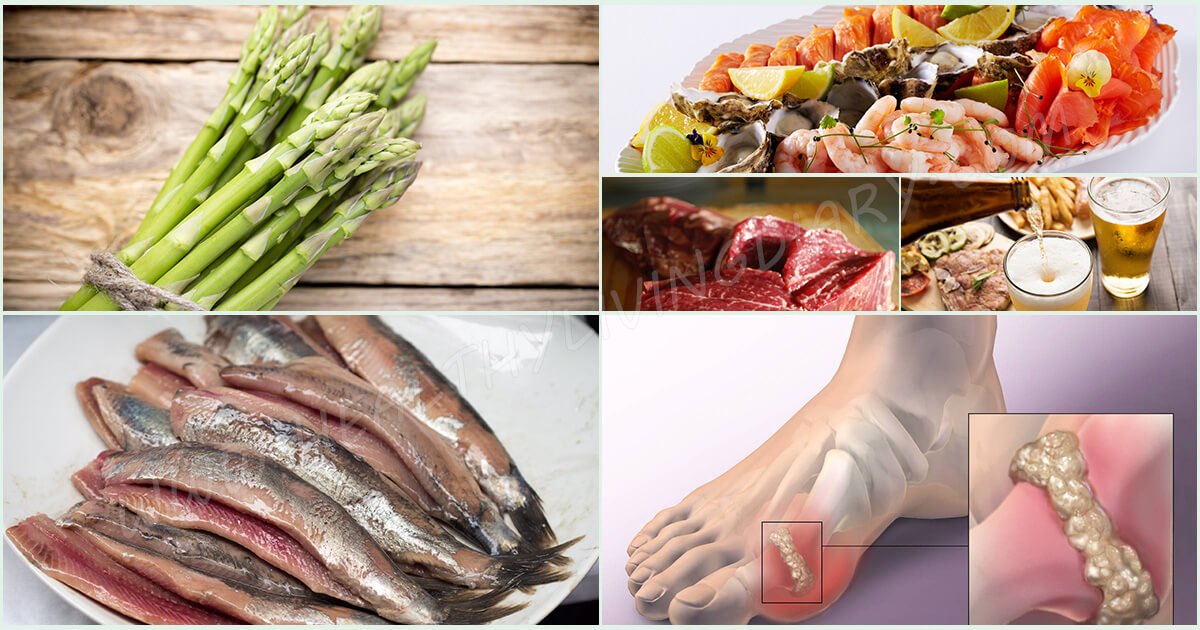Step 1. Understanding the link between gout and food
Gout is a type of arthritis that usually affects the peripheral joints, most often those in the big toe (first), but can also affect the knees, elbows, thumbs or fingers.
Gout is caused by deposits of urate crystals in the joints.
Urate is one of the breakdown products of compounds called purines.
People who suffer from gout tend to either produce more urate than normal or to excrete less in the form of uric acid. Gout is usually accompanied by raised blood urate levels.
Purines, which are broken down to urate and uric acid originate from two sources, dietary protein and body synthesis.
Men are much more prone to develop gout than women, although post-menopausal women also run an increased risk.
Read: Signs, symptoms, treatment and risk factors for developing gout
Factors that can precipitate a gout attack, include:
Overweight – many patients who suffer from gout are overweight or obese
Alcohol – acute attacks of gout are often precipitated by overindulgence in alcohol
Dietary purines – eating foods rich in purines (meat, fish, fish roes) can cause an attack
Starvation or very-low-energy diets – blood urate levels rise dramatically when body proteins are broken down due to starvation or very low energy intake
Kidney disease – any disease, such as chronic renal failure, which prevents the kidneys from functioning properly and excreting sufficient urate can cause gout
Other diseases – diseases such as leukaemia or psoriasis can cause increases in urate production
Drugs – chemical compounds which decrease the excretion of urates, such as the so-called thiazide diuretics used to treat hypertension and edema, can cause a gout attack
Read: Gout and diet: the latest research
Step 2: Adopting new, healthy habits
You can reduce your risk of another gout attack. Follow these guidelines:
Reduce weight
Avoid alcohol: Cut down on alcohol intake drastically. If necessary avoid all alcohol or restrict drinking to less than two drinks a day. A harsh, but effective way of preventing gout.
Avoid gorging: Avoid rich, heavy meals which contain lots of fat and purines – i.e. the typical Christmas dinner is an excellent example of a meal laden with fat and purines.
Avoid purines: Avoid high-purine foods like liver, kidneys, sweetbreads, sardines, anchovies, fish roes (eggs and caviar) and meat extracts.
Drink water: Drink six or more glasses of water throughout the day and a glass at night before going to bed to help the kidneys excrete urates.
Go easy on caffeinated drinks: Don't overdo tea and coffee drinking and switch to rooibos tea if you find your joints start aching after a coffee/tea binge.
Read: All kinds of alcohol can bring on gout
Step 3: The basic principles of restricting dietary purines
Water – Drink at least six glasses per day and make sure that you have one of the glasses before you go to sleep. It helps getting rid of uric acid.
Tofu (bean curd) – Use as protein source. Research suggests that it increases uric acid secretion.
Macronutrients – Diet should be relatively high in carbohydrate (like bread, rice and pasta), moderate in protein (e.g. tofu) and low in fat.
Alcohol – An excess of alcohol should be avoided. Total abstinence and avoidance of alcohol may be required in severe cases.
Body weight – Maintenance of, or gradual reduction to, ideal body weight could prove helpful.
The absolute don’ts:
Avoid foods with a high purine content. The following foods contain 100 to 1 000 mg of purine nitrogen per 100 g of food:
Anchovies
Brains
Consommé
Goose
Gravy
Heart
Herring
Kidney
Mackerel
Meat extracts
Mincemeat
Mussels
Roe
Sardines
Yeast (baker’s and brewer’s, taken as supplement)
The maybes, and in moderation
Foods with a moderate purine content
These foods contain 9 to 100 mg of purine nitrogen per 100 g of food. One serving of meat, fish or poultry (90 g) or one serving of vegetables (1/2 cup) from this group, is allowed per day, depending on the condition of the patient:
Asparagus
Dried beans
Lentils
Meat, fish and poultry (except the above-mentioned)
Mushrooms
Dried peas
Shellfish
Spinach
The yes foods
The foods with a low purine content
These foods contain negligible amounts of purine and may be used daily:
Bread (white) and crackers
Butter or margarine (in moderation)
Cake and cookies
Carbonated beverages
Cereals
Cheese
Cherries
Chocolate
Coffee
Cream (in moderation)
Custard
Eggs
Fats (in moderation)
Fruit
Gelatin desserts
Herbs
Ice cream
Milk
Noodles
Nuts
Oil
Olives
Pickles
Pasta
Popcorn
Puddings
Relishes
Rice
Salt
Sugar and sweets
Tea
Vegetables (except those mentioned in the first group)
Vinegar
Source: Krause’s Food, Nutrition, & Diet therapy, 10th edition (Mahan LK, Escott-Stump S)
Fuente: www.health24.com
